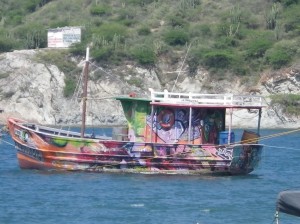In the first week of November 2012, the 65th Annual Conference of the Gulf and Caribbean Fisheries Institute (GCFI) took place in Santa Marta, Colombia. GCFI facilitates the exchange of experiences and ideas in fisheries science, management, governance, conservation and education. The conference was a testament to the region’s commitment to the stewardship of the Gulf of Mexico and the Caribbean Sea, and the marine resources therein. The Caribbean Sea is a special place for me, because I grew up in Trinidad and because I discovered my niche in Caribbean fisheries while doing my Master’s thesis on the fishing of queen conch in Tobago. The theme of this year’s conference was “Artisanal fisheries: importance, implications and challenges for management,” a topic which is familiar to many of us. Artisanal fishing is defined by the Food and Agriculture Organisation (FAO) as fishing carried out by individuals or households requiring low investment in technology and gear. By this measure, the majority of Caribbean fisheries operations are artisanal or small-scale.
The conference’s keynote speaker was Dr Ratana Chuenpagdee, who is no stranger to the Sea Around Us Project. Dr Chuenpagdee completed her PhD under Dr Daniel Pauly’s supervision in 1998 and is now the Canada Research Chair in Natural Resource Sustainability and Community Development at the Memorial University of Newfoundland, St. John’s. She urged the GCFI conference participants to consider ways to elevate the profile of small-scale fisheries, which – in terms of providing employment for fishers and catches for human consumption – are simply “too big to ignore” [1]. Dr Chuenpagdee is a powerhouse, and I was eager to chat with her at a socio-economic café where I got the opportunity to ask whether we erroneously mislabel our fisheries as small.
In terms of technological capacity, small-scale fisheries are certainly “small” compared to industrial ventures, but they are rather large in terms of the employment they provide for fishers as well as the quantity of catch they supply for human consumption [2]. Undoubtedly, the dearth of quantitative catch data associated with small-scale fishing sectors perpetuates this false notion of their size. As Dr Pauly plainly states in his foreword to the book “World small-scale fisheries: contemporary visions” (edited by Dr. Chuenpagdee), “countries cannot be bothered with the logistical and administrative nightmare that monitoring and reporting on small-scale fisheries often represents” [3]. As a native of the Caribbean and a research assistant with the Sea Around Us Project, I feel it to be my duty to reconstruct this historical fisheries information.
During my presentation at the conference, I explained how using information on catch, effort and seafood demand (i.e., consumption, as per household surveys) allowed me and my colleagues to reconstruct total marine fisheries catches for 10 Caribbean island countries from 1950 to 2010. Unsurprisingly, these catch reconstructions illustrated a substantial level of under-reporting in the Caribbean. For example, the reconstructed catches of Haiti and Jamaica were 3 and 4.3 times higher, respectively, than catches reported by these countries to the FAO, where the data become part of the world “catch” database. Overall, approximately 5 million tonnes of unreported catches were estimated for these 10 Caribbean countries during the 60-year period that we examined, with an average of 54,000 tonnes of unreported catches each year. The main discrepancy was due to unreported and under-reported catches from the artisanal, subsistence and recreational sectors. However, reporting seems to be improving as unreported catches in the early time period accounted for 80% of reconstructed catches, as opposed to 50% in the present time period.
The presentation was well-received and I had a number of scientists and fishers as well as an anthropologist interested in learning more about the Sea Around Us Project. Despite the English-Spanish language barrier, the GCFI spirit demonstrated that we are just one planet, working together for our precious oceans – questioning, sharing and improving things.
References
[1] “Too big to ignore” is a research network and knowledge mobilization partnership which aims to address the issues and challenges facing small-scale fisheries; http://toobigtoignore.net/
[2] Jacquet J and Pauly D (2008) Funding priorities: big barriers to small-scale fisheries. Conservation Biology 22(4): 832-835.
[3] Chuenpagdee R, editor (2011) World small-scale fisheries: contemporary visions. Eburon, Delft. 400 p.


